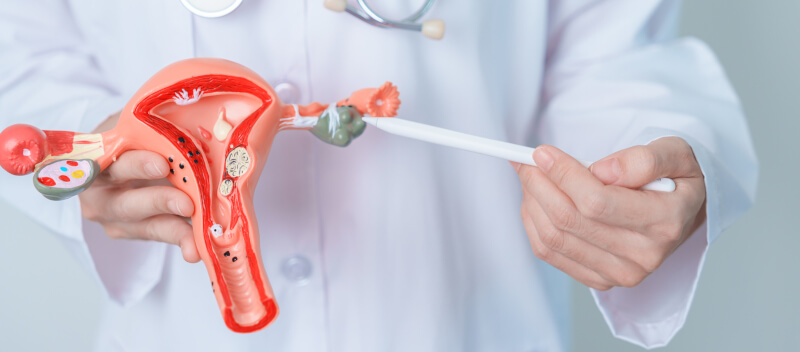Endometriosis is no stranger to many, affecting roughly 10% of women globally. It’s a painful condition that doesn’t only affect the body but also the spirit. Imagine chronic exhaustion paired with discomfort during intimate moments. Such is the reality for many women.
In an age where we’ve made significant medical strides, it’s baffling how women, particularly in the UK, often wait up to 7.5 years before an accurate endometriosis diagnosis. This latency can result in complications, including damage to the bowel and uterus, even leading to infertility.
The complex tapestry of endometriosis remains elusive, primarily because its roots remain unidentified. Interestingly, recent research suggests a fascinating relationship between endometriosis and the immune system.
Endometriosis and the Immune Tango
At the heart of this relationship lies inflammation, a fundamental tool of our immune system. Picture this: a cut on your finger triggers warmth, redness, and swelling – that’s your immune system using inflammation to heal. But, at times, our bodies get the signals mixed up, persistently activating inflammation even when there’s no threat. That’s where issues like rheumatoid arthritis come into play.
Did you know? The monthly menstrual cycle itself is a dance of inflammation. The first half thickens the womb lining, ready for a potential baby, with the immune system ramped up. This is why some women with autoimmune disorders may feel the strain more during this period. Meanwhile, the latter half of the cycle dials the immune response down to ensure a fertilized egg’s safety.
The Immune System’s Peculiar Behavior in Endometriosis
It’s undeniable: endometriosis patients exhibit unique immune patterns. There’s a heightened inflammatory response, and some of their immune warriors, known as natural killer cells, seem oddly inactive. These cells are vital for fending off diseases and maintaining balance, so their altered behavior in endometriosis patients is a point of curiosity.
A potential link between autoimmune disorders like lupus, rheumatoid arthritis, and endometriosis could further underscore the immune system’s role. Interestingly, some reports suggest that women with endometriosis might experience heightened symptoms when faced with infections. For instance, COVID-19 seems to hit harder for those grappling with endometriosis.
Endometriosis in the Era of COVID-19
Recent studies shed light on how COVID-19 might intensify common endometriosis symptoms such as pelvic pain, fatigue, and even mood swings. Furthermore, the long-lasting symptoms of COVID-19, often termed “long COVID,” might persist more prominently in endometriosis patients.
While the connection between the immune system and endometriosis remains enigmatic, it’s an avenue that could pave the way to more effective treatments or even a potential cure.
The Difficulties of Endometriosis
Impact on Daily Life
Endometriosis, with its debilitating symptoms, can significantly reduce the quality of life for affected women. Chronic exhaustion, often synonymous with the condition, can result in decreased productivity at work, missed social engagements, and an overall sense of being overwhelmed. Moreover, pain during intimacy not only impacts physical well-being but can strain relationships, leading to feelings of isolation and inadequacy.
Physical Complications
Untreated or poorly managed endometriosis poses severe physical health risks. The continuous inflammation and scar tissue formation can result in damage to adjacent organs, including the bowel and uterus. In some cases, it might even lead to infertility, depriving women of the choice to conceive naturally. In addition, prolonged inflammation might increase susceptibility to other conditions, potentially creating a domino effect on health.
Emotional and Mental Toll
Living with endometriosis isn’t just about managing physical symptoms; the disease also takes a toll on mental health. The uncertainty of flare-ups, coupled with the feeling of being misunderstood, can lead to anxiety and depression. The stigma surrounding menstrual health further exacerbates feelings of isolation, making it crucial for affected individuals to find support networks and appropriate mental health resources.
Financial Strain
Medical expenses related to endometriosis can quickly stack up, making it a financial burden for many. From diagnostics to treatments, costs can become a significant concern, especially in regions where healthcare isn’t easily accessible or affordable. Furthermore, the potential inability to work due to pain or exhaustion may result in lost wages, amplifying financial stresses.
Impact on Immune System
Emerging research suggests endometriosis has a peculiar relationship with the immune system. Women with this condition often exhibit a heightened inflammatory response and altered immune cell behavior. This immune system dysregulation may increase susceptibility to infections and potentially aggravate symptoms of other autoimmune disorders, making it a double-edged sword for those already predisposed to immune-related conditions.
Treatment Challenges
The path to diagnosing endometriosis is often riddled with delays, leading many women to live with the condition undiagnosed for years. Even when diagnosed, effective treatment can be elusive. With no known cure, management often revolves around pain relief, which doesn’t necessarily address the root cause. Additionally, treatment modalities can come with their side effects, sometimes adding to the challenges women face.
Reproductive Challenges
One of the most significant concerns for many women with endometriosis is the potential impact on fertility. The condition can cause damage to the ovaries and fallopian tubes, making natural conception challenging. This, coupled with the potential need for invasive treatments or surgeries, can make the journey to motherhood daunting and emotionally taxing.
Help to deal With Endometriosis
Understanding the Symptoms
- Always be aware of your body. If you experience chronic pelvic pain, exhaustion, or discomfort during intimacy, consider reaching out to a healthcare professional for a discussion. Remember, early detection can make a significant difference in managing and treating endometriosis.
Regular Medical Check-ups
- Schedule regular visits to your gynecologist, especially if you have a family history of endometriosis. These check-ups can help detect the condition early on and ensure you’re on the right path for management and potential treatment.
Managing Inflammation
- Considering the link between inflammation and endometriosis, focus on an anti-inflammatory diet. Incorporate foods rich in omega-3s, antioxidants, and fiber. Moreover, avoid foods that may trigger inflammation, like processed meats, sugary beverages, and excessive caffeine.
Strengthening the Immune System
- Since endometriosis may impact the immune system, make it a priority to bolster yours. Engage in regular exercise, get adequate sleep, manage stress through practices like meditation or yoga, and eat a balanced diet. This can help your immune system function optimally and potentially reduce endometriosis-related complications.
Seek Support and Counseling
- Living with endometriosis can be emotionally taxing. Seek out local support groups, where you can connect with others who understand your experiences. Additionally, consider therapy or counseling, which can offer coping strategies and a platform to express your feelings.
Research and Stay Updated
- Endometriosis research is ongoing, and understanding how it ties with the immune system is still being unraveled. Stay updated with the latest findings, which can provide insights into new treatment methods or management techniques.
FAQs on Endometriosis and the Immune System
Q: How does endometriosis impact the immune system?
- A: Endometriosis seems to have a connection with the immune system. Women with this condition often exhibit heightened inflammation and altered immune cell responses. The exact cause and effect are still under investigation.
Q: Can boosting my immune system help manage endometriosis?
- A: Strengthening your immune system can potentially reduce complications and improve overall health. However, whether it directly impacts endometriosis management is still being studied.
Q: Are there any foods that can help manage endometriosis symptoms?
- A: Yes, an anti-inflammatory diet can help. Foods like fatty fish, nuts, seeds, berries, and green leafy vegetables might be beneficial. Avoiding inflammatory triggers like processed foods and excessive sugar can also help.




